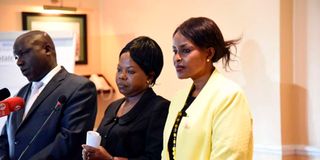President Kenyatta finally moves to fill IEBC vacancies

Paul Kurgat, Margaret Mwachanya and Connie Nkatha Maina announce their resignation from the position IEBC commissioner during a press briefing at Stanley hotel in Nairobi on April 16, 2018.
What you need to know:
- The announcement of the vacancies means President Kenyatta now has 14 days within which to constitute a selection panel to fill the vacancies, according to the law.
President Uhuru Kenyatta has finally moved to fill the four vacancies at the electoral commission, more than two years after they occurred.
In a Gazette notice dated April 14, President Kenyatta declared the vacancies, setting the stage for the appointment of the new commissioners following the constitution of a selection panel.
The four vacancies in the Independent Electoral and Boundaries Commission (IEBC) occurred after the joint resignations of vice-chairperson Connie Nkatha Maina, and commissioners Paul Kurgat and Margaret Mwachanya in April 2018.
The three joined commissioner Dr Roselyne Akombe who quit in a huff just days to the October 26, 2017 repeat election protesting what she said were irregularities that had not been fixed even after the September 1, 2017 landmark Supreme Court ruling that nullified President Kenyatta’s re-election.
The move by President Kenyatta to announce the four vacancies comes as the best confirmation yet that IEBC chairman Wafula Chebukati and Commissioners Boya Molu and Prof Abdi Guliye, who had, since the resignations, faced constant calls of their removal, may yet complete their term which ends in 2023.
The next general election is in August 2022.
Selection panel
The announcement of the vacancies means President Kenyatta now has 14 days within which to constitute a selection panel to fill the vacancies, according to the law.
The law assented to by President Uhuru Kenyatta last year, which will now be used in the fresh recruitment, gives Parliament the biggest say in the filling of vacancies at the IEBC by giving it four out of the seven slots in the selection panel.
Of the proposed seven-member IEBC selection panel, the Parliamentary Service Commission (PSC) will nominate four of them.
Besides the four members—two men and two women—to be nominated by the PSC, other representatives in the seven-member selection panel will be one person nominated by the Law Society of Kenya (LSK), as well as two picked by the Inter-religious Council of Kenya.
The PSC will also provide secretariat services to the selection panel.
Representatives
In the new law, Parliament agreed to reduce the representations of religious groups in the selection panel to recruit the poll chiefs from the previous five to just two.
The panel, which picked the Wafula Chebukati-led team in 2017, was chaired by Catholic Church-nominated Bernadette Musundi and had five persons nominated by religious groups, and four from the leading political groupings.
In the new law, Parliament also deleted the provision to have one representative each from the Public Service Commission, the Ethics and Anti-Corruption Commission, the National Gender and Equality Commission as well as the Kenya National Commission on Human Rights.
“A person is qualified for appointment as a member of the selection panel if such person — is a citizen of Kenya; meets the requirements of leadership and integrity set out in Chapter Six of the Constitution; and holds a degree from a university recognised in Kenya,” the law states.
The process is expected to start immediately, with Treasury already having indicated the availability of funds for the exercise.
“Additional funding amounting to Sh84.5 million has been factored to cater for the Selection Panel for commissioners of the Independent Electoral and Boundaries Commission,” Treasury said in a mini-budget with regards to the PSC two months ago.
Chaired by National Assembly Speaker Justin Muturi, the PSC is currently heavily tilted towards President Kenyatta-ODM leader Raila Odinga axis in the current political dispensation with only Kericho senator Aaron Cheruiyot and Malindi MP Aisha Jumwa leaning towards Deputy President William Ruto in the 11-member team.
A push by the Odinga-led ODM to have the entire commission disbanded and the recruitment done afresh in the Uhuru-Raila-backed Building Bridges Initiative (BBI) seemed to have taken a backseat after subsequent edits to the document deleted a provision that wanted Kenya to go to the 2022 poll on a “clean slate”.
In his submissions to the IEBC team, Mr Chebukati dismissed the push to send them all home saying it will be ill-advised.
“Going into the 2022 General Election with a new set of commissioners and secretariat staff will not only seriously undermine (the) credibility of the elections but may also result in political instability,” Mr Chebukati told the BBI team in a memorandum.
He explained: “The conduct of elections is not an event but follows a five-year electoral cycle that requires sufficient preparation, overseen by personnel with requisite knowledge and skills.”





